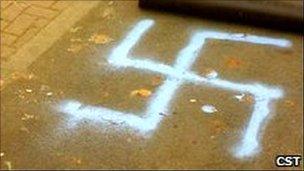Hate crime figures published for the first time
- Published

Graffiti at a Manchester synagogue - 700 anti-Semitic crimes were reported
Hate crime figures for England, Wales and Northern Ireland have been published for the first time.
In 2009 a total of 52,028 crimes were recorded in which the offence was motivated by prejudice.
Victims were targeted because of race, religious belief, sexual orientation, disability or transgender issues.
Chief Constable Stephen Otter of police chiefs' body Acpo said: "By publishing this data... we hope to encourage victims and witnesses to come forward."
The vast majority were targeted because of their race - 43,426 (up from 39,300), and the others were classified as sexual orientation - 4,805; religion/faith - 2,083; disability - 1,402 and transgender - 312.
An Acpo spokesman said 703 crimes were anti-Semitic.
Mr Otter, Acpo's lead for equality, diversity and human rights, said: "Hate crimes cause a great deal of harm among victims and communities.
"Publication of the data underlines the commitment of the police service to tackle hate crime, build confidence and encourage victims to come forward so that under-reporting is reduced."
Although data was not collated nationally before 2009, Acpo says it believes there has been a rise in all five types of hate crime.
'Much work to do'
Professor John Grieve CBE, independent chair of the government's Hate Crime Advisory Group, welcomed the data and said: "It represents a significant step forward in our understanding of the nature and extent of hate crime in England, Wales and Northern Ireland."
Prof Grieve, a former deputy assistant commissioner with the Metropolitan Police who set up a racial and violent crime task force at Scotland Yard, said: "The UK is amongst world leaders in the way that it responds to hate crime, but there is still much work to do.
"One of the greatest challenges is to reduce the under-reporting of hate crime. We welcome the government's commitment to increase reporting and we will be examining this data in the forthcoming months and years to better understand the extent of crime and to challenge where performance does not meet the high standards that the public rightly demands of the criminal justice agencies."
- Published14 November 2010